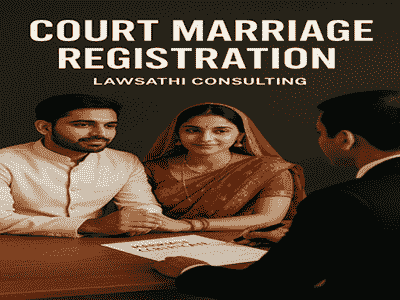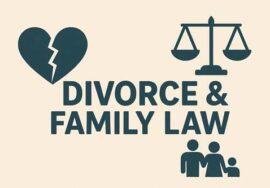
Court Marriage in Delhi Under the Special Marriage Act, 1954
Introduction
Marriage in India is not only a sacred bond but also a legally binding contract. While traditional marriages follow religious customs, court marriages take place under the Special Marriage Act, 1954 — a secular law that gives every adult the freedom to marry irrespective of religion, caste, or nationality. Court Marriage Lawyer in Delhi.
In Delhi, court marriages are conducted before a Marriage Officer (SDM) and carry the same legal validity as any religious ceremony. This article explains what marriage means in legal terms, the procedure for court marriage in Delhi, eligibility criteria, required documents, time, fees, and frequently asked questions — all in one place.
Court Marriage
A court marriage is performed in front of a Marriage Officer (generally an SDM) and three witnesses. Unlike traditional rituals, it follows a legal procedure under the Special Marriage Act, 1954.
This process ensures equal rights, legal recognition, and official registration of marriage irrespective of caste, religion, or nationality.
What Is a Court Marriage?
A court marriage is a formal marriage performed in the presence of a Marriage Officer and three witnesses, without any religious ritual. It ensures legal recognition and protection for both partners.
This process is ideal for inter-religious, inter-caste, or NRI couples, and those who prefer a simple, lawful, and hassle-free marriage. Once registered, the marriage certificate serves as conclusive legal proof across India.
Procedure of Court Marriage in Delhi
The procedure for court marriage in Delhi is transparent and systematic. Let’s understand the step-by-step process:
Notice of Intended Marriage
The couple must file a written notice of intended marriage to the Marriage Officer of the district where at least one partner has resided for 30 days or more.
Publication of Notice
The Marriage Officer publishes the notice at his office. If there’s no objection within 30 days, the officer can proceed further.
Objection and Inquiry (if any)
If anyone objects, the officer must inquire and decide the objection within 30 days. If the objection is invalid, the marriage may continue.
Signing of the Declaration
Both parties and three witnesses must sign a declaration before the Marriage Officer.
Marriage Solemnization
After completion of all formalities, the Marriage Officer solemnizes the marriage in the office.
Issuance of Marriage Certificate
The officer issues an official Marriage Certificate, which serves as conclusive legal proof of the marriage.
Eligibility Criteria for Court Marriage in Delhi
To be eligible for a court marriage under the Special Marriage Act, 1954, both partners must fulfill the following conditions:
The bridegroom must be at least 21 years old.
The bride must be at least 18 years old.
Both must be of sound mind and capable of giving valid consent.
Neither partner should have a living spouse at the time of marriage.
The relationship must not fall within the prohibited degrees of relationship as defined under the Act.
At least one partner must reside in Delhi for 30 days before submitting the notice.
Required Documents for Court Marriage
To complete the process, both parties must submit the following documents:
Proof of age (Birth certificate, 10th mark sheet, Passport, etc.)
Proof of residence (Aadhaar card, voter ID, driving license, or rent agreement)
Passport-size photographs (Four each)
Affidavit of marital status (Unmarried/widower/divorcee)
Divorce decree (if previously married and divorced)
Death certificate (if widow/widower)
NOC from Embassy (for foreign nationals)
Proof of ID from their Nation (for foreign nationals)
Proof of residence in Delhi for at least 30 days (electricity bill, rent agreement, etc.)
Time Required for Court Marriage
Generally, the entire process takes 30 to 40 days, including the notice period and solemnization. The timeline depends on when the Marriage Officer is available and when the necessary documents are completed. Sometimes it depends on case complexity.
Court Marriage Fees in Delhi
The government fee for filing the notice of intended marriage, while the solemnization and certificate issuance may cost an additional fee.
If you engage a legal expert or advocate, professional service charges may vary depending on the case’s complexity.
Conclusion
The Special Marriage Act, 1954, ensures that love transcends religion, caste, and background. A court marriage in Delhi provides legal security, social recognition, and constitutional protection to couples who wish to marry lawfully.
By following the correct procedure, documentation, and eligibility norms, couples can solemnize their marriage smoothly without complications.
FAQs – Court Marriage in Delhi
- Can people of different religions marry under the Special Marriage Act?
Yes, absolutely. The Act allows inter-faith marriages without conversion.
- Is court marriage valid all over India?
Yes. Once registered, it is legally valid and recognized across India.
- How long does the court marriage process take in Delhi?
It usually takes 30 to 40 days, including the mandatory 30-day notice period.
- Can NRIs or foreign nationals marry under this Act?
Yes, they can, provided one partner resides in India for at least 30 days and the embassy issues a No Objection Certificate.
- Is witness presence mandatory?
Yes, three adult witnesses are required at the time of solemnization.
Other Keywords
Court Marriage Lawyer in Delhi, Special Marriage Act 1954, Court Marriage Procedure Delhi, Marriage Registration in Delhi, Documents for Court Marriage Delhi, Marriage Officer Delhi, Interfaith Marriage Delhi, How to Register Court Marriage in Delhi. Court Marriage Lawyer in Delhi.
Disclaimer: This article is for educational and informational purposes only. It provides a general understanding of legal remedies but does not constitute legal advice. For specific legal guidance, you can consult a legal expert.




